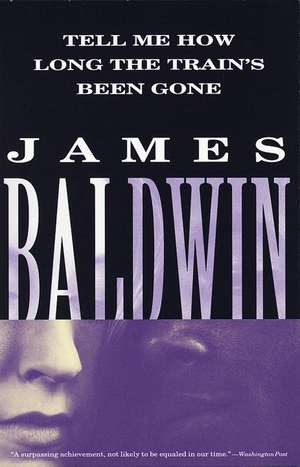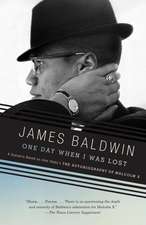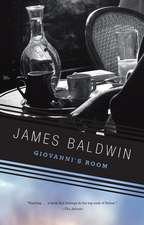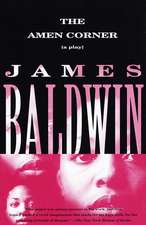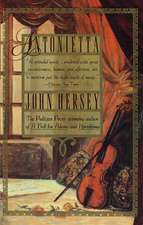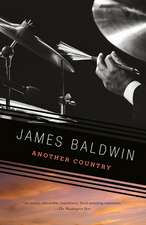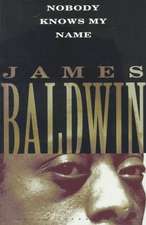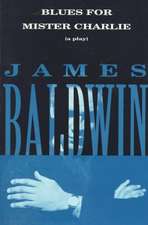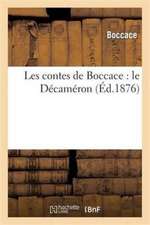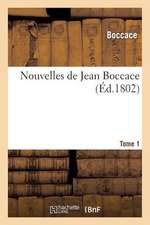Tell Me How Long the Train's Been Gone
Autor James A. Baldwinen Limba Engleză Paperback – 31 ian 1998
For between Leo's childhood on the streets of Harlem and his arrival into the intoxicating world of the theater lies a wilderness of desire and loss, shame and rage. An adored older brother vanishes into prison. There are love affairs with a white woman and a younger black man, each of whom will make irresistible claims on Leo's loyalty. And everywhere there is the anguish of being black in a society that at times seems poised on the brink of total racial war. Overpowering in its vitality, extravagant in the intensity of its feeling, Tell Me How Long the Train's Been Gone is a major work of American literature.
Preț: 102.88 lei
Nou
Puncte Express: 154
Preț estimativ în valută:
19.69€ • 20.55$ • 16.29£
19.69€ • 20.55$ • 16.29£
Carte disponibilă
Livrare economică 14-28 martie
Livrare express 27 februarie-05 martie pentru 57.46 lei
Preluare comenzi: 021 569.72.76
Specificații
ISBN-13: 9780375701894
ISBN-10: 0375701893
Pagini: 496
Dimensiuni: 129 x 207 x 27 mm
Greutate: 0.39 kg
Ediția:Vintage Intl.
Editura: Vintage Publishing
ISBN-10: 0375701893
Pagini: 496
Dimensiuni: 129 x 207 x 27 mm
Greutate: 0.39 kg
Ediția:Vintage Intl.
Editura: Vintage Publishing
Extras
I went down again. My heart and I went down again. I was aware of her hand. I was aware of my breathing. I could no longer see it, but I was aware of her face.
"Barbara. My dear Barbara."
"My dearest Leo. Please be still."
And she's right, I thought. There is nothing more to be said. All we can do now is just hold on. That was why she held my hand. I recognized this as love--recognized it very quietly and, for the first time, without fear. My life, that desperately treacherous labyrinth, seemed to fall where there had been no light before. I began to see myself in others. I began for a moment to apprehend how Christopher must sometimes have felt. Everyone wishes to be loved, but in the event, nearly no one can bear it. Everyone desires love but also finds it impossible to believe that he deserves it. However great the private disasters to which love may lead, love itself is strikingly and mysteriously impersonal; it is a reality which is not altered by anything one does. Therefore, one does many things, turns the key in the lock over and over again, hoping to be locked out. Once locked out, one will never again be forced to encounter in the eyes of a stranger who loves him the impenetrable truth concerning the stranger, oneself, who is loved. And yet--one would prefer, after all, not to be locked out. One would prefer, merely, that the key unlocked a less stunningly unusual door.
The door to my maturity. This phrase floated to the top of my mind. The light that fell backward on that life of mine revealed a very frightened man--a very frightened boy. The light did not fall on me, on me were I lay now. I was left in darkness, my face could not be seen. In that darkness I encountered a scene from another nightmare I had had as a child. In this nightmare there is a book--a great, heavy book with an illustrated cover. The cover shows a dark, squalid alley, all garbage cans and dying cats, and windows like empty eyesockets. The beam of a flashlight shines down the alley, at the end of which I am fleeing, clutching something. the title of the book in my nightmare is, We Must Not Find Him, For He Is Lost.
When Caleb, my older brother, was taken from me and sent to prison, I watched, from the fire escape of our East Harlem tenement, the walls of an old and massive building, far, far away and set on a hill, and with green vines running up and down the walls, and with windows flashing like signals in the sunlight. I watched that building, I say, with a child's helpless and stricken attention, waiting for my brother to come out of there. I did not know how to get to the building. If I had I would have slept in the shadow of those walls, and I told no one of my vigil or of my certain knowledge that my brother was imprisoned in that place. I watched that building for many years. Sometimes, when the sunlight flashed on the windows, I was certain that my brother was signaling to me and I waved back. When we moved from that particular tenement (into another one) I screamed and cried because I was certain that now my brother would no longer be able to find me. Alas, he was not there; the building turned out to be City College; my brother was on a prison farm in the Deep South, working the fields.
"Barbara. My dear Barbara."
"My dearest Leo. Please be still."
And she's right, I thought. There is nothing more to be said. All we can do now is just hold on. That was why she held my hand. I recognized this as love--recognized it very quietly and, for the first time, without fear. My life, that desperately treacherous labyrinth, seemed to fall where there had been no light before. I began to see myself in others. I began for a moment to apprehend how Christopher must sometimes have felt. Everyone wishes to be loved, but in the event, nearly no one can bear it. Everyone desires love but also finds it impossible to believe that he deserves it. However great the private disasters to which love may lead, love itself is strikingly and mysteriously impersonal; it is a reality which is not altered by anything one does. Therefore, one does many things, turns the key in the lock over and over again, hoping to be locked out. Once locked out, one will never again be forced to encounter in the eyes of a stranger who loves him the impenetrable truth concerning the stranger, oneself, who is loved. And yet--one would prefer, after all, not to be locked out. One would prefer, merely, that the key unlocked a less stunningly unusual door.
The door to my maturity. This phrase floated to the top of my mind. The light that fell backward on that life of mine revealed a very frightened man--a very frightened boy. The light did not fall on me, on me were I lay now. I was left in darkness, my face could not be seen. In that darkness I encountered a scene from another nightmare I had had as a child. In this nightmare there is a book--a great, heavy book with an illustrated cover. The cover shows a dark, squalid alley, all garbage cans and dying cats, and windows like empty eyesockets. The beam of a flashlight shines down the alley, at the end of which I am fleeing, clutching something. the title of the book in my nightmare is, We Must Not Find Him, For He Is Lost.
When Caleb, my older brother, was taken from me and sent to prison, I watched, from the fire escape of our East Harlem tenement, the walls of an old and massive building, far, far away and set on a hill, and with green vines running up and down the walls, and with windows flashing like signals in the sunlight. I watched that building, I say, with a child's helpless and stricken attention, waiting for my brother to come out of there. I did not know how to get to the building. If I had I would have slept in the shadow of those walls, and I told no one of my vigil or of my certain knowledge that my brother was imprisoned in that place. I watched that building for many years. Sometimes, when the sunlight flashed on the windows, I was certain that my brother was signaling to me and I waved back. When we moved from that particular tenement (into another one) I screamed and cried because I was certain that now my brother would no longer be able to find me. Alas, he was not there; the building turned out to be City College; my brother was on a prison farm in the Deep South, working the fields.
Recenzii
"Baldwin is one of the few genuinely indispensable American writers."
--Saturday Review
"He has not himself lost access to the sources of his being--which is what makes him read and awaited by perhaps a wider range of people than any other major American writer."
--The Nation
--Saturday Review
"He has not himself lost access to the sources of his being--which is what makes him read and awaited by perhaps a wider range of people than any other major American writer."
--The Nation
